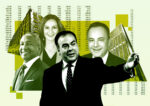Cook County Assessor Fritz Kaegi continues to blame the Board of Review for any property tax increases among Chicago-area homeowners, with a recent emphasis on the northern suburb of Evanston.
The assessor’s office increased property valuations in the northern suburb of Evanston by 28 percent in 2022, which will be reflected in upcoming fall tax bills, Kaegi said in a letter.
Kaegi is telling Evanston homeowners to point the finger at the Board of Review if their tax bills are higher than they think they ought to be. His letter extends a disagreement with the Cook County Board of Review, which has final authority of property taxes. Kaegi has taken issue with the board by calling for commercial real estate properties to bear more of the tax burden despite struggling office and retail sectors.
The three-member review board has emphasized that commercial real estate is in a “depression,” as stubborn remote-work trends, rising interest rates and banking uncertainties continue to cause record high vacancies and an uptick in distress-related challenges.
In February, Kaegi previously planned to reverse big tax breaks for more than 500 commercial properties in downtown Chicago, reinstating higher values after the Board of Review decided to lower them previously. But the Board of Review recently pushed back once again, granting appeals for 431 out of 551 commercial properties to cut the total assessed value from $4.6 to $3.6 billion.
Property owners can appeal to the Cook County Board of Review if they believe their properties are overvalued, and thus set to pay a disproportionate share of their community’s tax burden.
Kaegi’s letter explained that an increase in valuations doesn’t necessarily indicate a spike in property taxes. If a property’s assessment increases in line with others and levies remain constant, the tax bill may stay the same. If a property’s assessment increases but by a lower percentage than other properties, the tax bill could decrease if levies are not raised.
However, Kaegi stressed that appeals granted at the Board of Review can affect all tax bills and increase the total for homeowners. He also noted that the assessor’s office is not the final authority on appeals and assessment changes.
Read more



While giving office and retail landlords a tax break may seem like a logical move amid current market conditions, Kaegi continues to emphasize how lowering commercial assessments burdens homeowners. For instance, if the assessed value of downtown office buildings drops by 40 percent, the average Chicago home’s property tax bill could rise from $5,244 to $5,723 to offset the depreciation, assuming taxing authorities maintain their current levy rates.
After the appeal process, the Cook County Clerk will calculate property tax rates for all government units in Cook County. The County Treasurer will then send out the second installment property tax bills due on Dec. 1.
